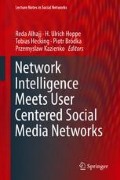Abstract
In this paper, we investigate an interpretable definition of promising research topics, complemented with a predictive model. Two methods of topic identification were employed: bag of words and the LDA model, with reflection on their applicability and usefulness in the task of retrieving topics on a set of publication titles. Next, different criteria for promising topic were analyzed with respect to their usefulness and shortcomings. For verification purposes, the DBLP data set, an online open reference of computer science publications, is used. The presented results reveal potential of the proposed method for identification of promising research topics.
Access this chapter
Tax calculation will be finalised at checkout
Purchases are for personal use only
References
Blei, D.M., Ng, A.Y., Jordan, M.I.: Latent dirichlet allocation. Adv. Neural Inf. Proces. Syst. 1, 601–608 (2002)
Glänzel, W., Thijs, B.: Using ‘core documents’ for detecting and labelling new emerging topics. Scientometrics 91(2), 399–416 (2012)
He, Q., Chen, B., Pei, J., Qiu, B., Mitra, P., Giles, L.: Detecting topic evolution in scientific literature: how can citations help? In: Proceedings of the 18th ACM Conference on Information and Knowledge Management, CIKM ’09, pp. 957–966 (2009)
Hong, L., Davison, B.D.: Empirical study of topic modeling in twitter. In: Proceedings of the First Workshop on Social Media Analytics, SOMA ’10, pp. 80–88 (2010)
Hurtado, J.L., Agarwal, A., Zhu, X.: Topic discovery and future trend forecasting for texts. J. Big Data 3(1), 7 (2016)
Loper, E., Bird, S.: Nltk: The natural language toolkit. In: Proceedings of the ACL-02 Workshop on Effective Tools and Methodologies for Teaching Natural Language Processing and Computational Linguistics - Volume 1, ETMTNLP ’02, pp. 63–70 (2002)
Lu, Y., Zhang, P., Liu, J., Li, J., Deng, S.: Health-related hot topic detection in online communities using text clustering. PLoS One 8(02), e56221 (2013)
Mund, C., Neuhäusler, P.: Towards an early-stage identification of emerging topics in science–the usability of bibliometric characteristics. J. Informetrics 9(4), 1018–1033 (2015)
Prabhakaran, V., Hamilton, W.L., McFarland, D.A., Jurafsky, D.: Predicting the rise and fall of scientific topics from trends in their rhetorical framing. In: ACL (2016)
Wang, Y., Joo, S., Lu, K.: Exploring topics in the field of data science by analyzing Wikipedia documents: a preliminary result. Proc. Am. Soc. Inform. Sci. Technol. 51(1), 1–4 (2014)
Zhang, B., Guan, X., Khan, M.J., Zhou, Y.: A time-varying propagation model of hot topic on {BBS} sites and blog networks. Inform. Sci. 187, 15–32 (2012)
Acknowledgements
This work was partially supported by the National Science Centre, Poland, project no. 2016/21/B/ST6/01463 and by European Union’s Horizon 2020 research and innovation programme under the Marie Skłodowska-Curie grant no. 691152 (RENOIR); by the Polish Ministry of Science and Higher Education fund for supporting internationally co-financed projects in 2016-2019, no. 3628/H2020/2016/2.
Author information
Authors and Affiliations
Corresponding author
Editor information
Editors and Affiliations
Rights and permissions
Copyright information
© 2018 Springer International Publishing AG, part of Springer Nature
About this chapter
Cite this chapter
Klemiński, R., Kazienko, P. (2018). Identifying Promising Research Topics in Computer Science. In: Alhajj, R., Hoppe, H., Hecking, T., Bródka, P., Kazienko, P. (eds) Network Intelligence Meets User Centered Social Media Networks. ENIC 2017. Lecture Notes in Social Networks. Springer, Cham. https://doi.org/10.1007/978-3-319-90312-5_16
Download citation
DOI: https://doi.org/10.1007/978-3-319-90312-5_16
Published:
Publisher Name: Springer, Cham
Print ISBN: 978-3-319-90311-8
Online ISBN: 978-3-319-90312-5
eBook Packages: Social SciencesSocial Sciences (R0)

